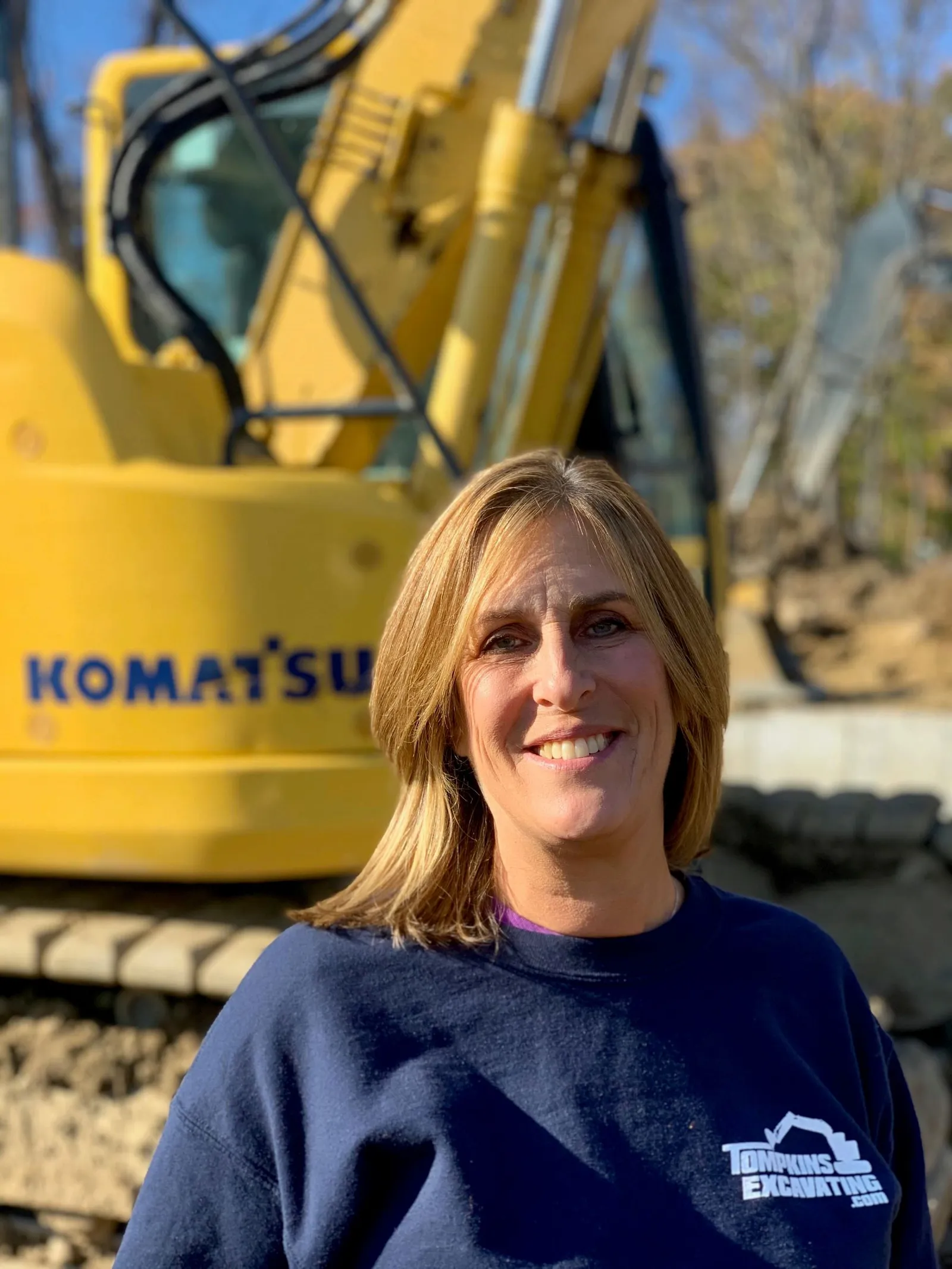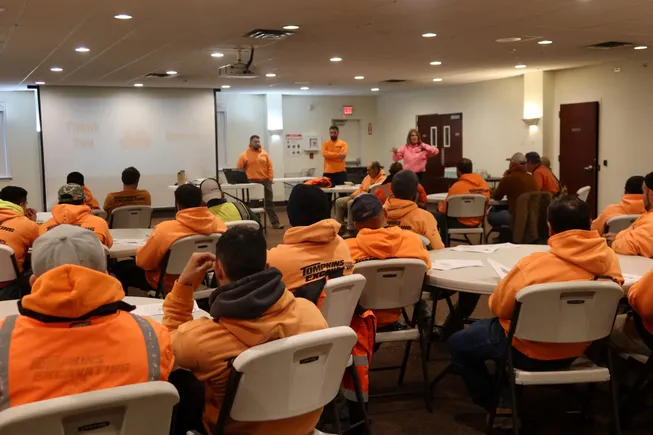This article is one in a series of conversations with women leaders in the construction industry. Click here for past discussions.
Before transitioning to the construction industry, Stacey Tompkins worked in management as a food service director for Aramark Services, overseeing corporate dining facilities for several high-profile Wall Street clients.
In 2013, she found her way into construction by stepping into the landscaping and hardscaping business her husband began. When more jobs started to include excavation, she realized there was an opportunity to bring Tompkins Landscaping to the next level by transforming it into Tompkins Excavating. The Putnam Valley, New York-based firm now has an annual revenue of $12 million.
As president, Tompkins has relied on her extensive management experience to help shape a company culture that attracts and retains top talent while emphasizing continuous training and professional development.
Tomkins also serves as a town councilwoman in Putnam Valley, where she resides with her husband and three sons, who have all played vital roles in the family business. Here, Construction Dive talks with Tompkins about her company’s new designation as a Minority- and Women-Owned Business Enterprise and what it took to receive it.
This interview has been edited for brevity and clarity.
CONSTRUCTION DIVE: What led you to choose construction for your career?
STACEY TOMPKINS: After spending years in a management role in a global corporation, I decided to join my husband and take the lead on implementing my vision. It was a big shift, but I was drawn to the challenges and rewards of the construction industry.

Stacey Tompkins
Permission granted by Tompkins Excavating
I appreciated the tangible results of our work — seeing a project come to life from the ground up. The construction sector also offered an opportunity to break stereotypes, especially as a woman in a traditionally male-dominated field. I wanted to make my mark, not just for myself, but to pave the way for other women in the industry.
What do you do in your current job?
I oversee all aspects of our operations, from project management and client relations to team development and strategic planning. My role involves ensuring that our projects align with our commitment to excellence and safety, and that we’re equipped with the latest technology and training. I’m deeply involved in fostering our company culture, which emphasizes teamwork and resilience, traits that have been crucial to our growth and success.
We are located in Putnam Valley in the Hudson Valley region of New York, a beautiful area that offers a mix of urban and rural projects. Our proximity to various municipalities allows us to engage in diverse work throughout Westchester, Putnam, Rockland and Orange Counties.
You recently received MWBE certification from the state of New York. What went into getting that?
Securing the MWBE certification was a journey filled with obstacles and resilience. It took 11 long years, during which I submitted three applications, faced denials and underwent multiple appeals. The process was not just about the paperwork; it was about advocating for recognition as a legitimate woman-owned business in an industry where such representation is scarce.
Throughout this journey, I worked closely with legal counsel and learned a lot about the intricacies of the certification process. It was crucial to demonstrate not just our qualifications but our commitment to diversity and inclusion in the construction sector.
This certification symbolizes not just my personal triumph but also a step forward for women in business, illustrating that persistence pays off.
How will it benefit your company?
While the certification may not be a requirement for our continued success, I’m certain that it will open up new opportunities for Tompkins Excavating. It allows us to compete for contracts specifically set aside for certified businesses, which can enhance our visibility in the marketplace.
This certification not only validates our status as a woman-owned business but also provides us with access to resources and support aimed at fostering growth and development for minority- and women-owned enterprises.
Moreover, the certification strengthens our brand reputation. Clients are increasingly looking for diverse partnerships, and being certified reinforces our commitment to equity and inclusion. It allows us to engage more deeply with the community, demonstrating our support for initiatives that promote diversity within the construction industry.
What benefits are there to working in construction?
The construction industry is dynamic and diverse, providing numerous opportunities for growth. There’s a constant demand for skilled labor, which means that individuals can find a wide range of career paths — from boots on the ground in the field, such as project management, to more behind-the-scenes positions such as engineering.
It’s also a field where innovation is key; technology is rapidly evolving, and those who embrace change can lead the way. Finally, the camaraderie and relationships built on-site can lead to lifelong connections, making construction a unique and rewarding career choice.
What advice would you give to young women considering construction as a career?
My advice for young women interested in a career in construction is simple: Don’t be afraid to step into this space. The industry is evolving, and there’s a growing demand for diverse perspectives. Embrace the challenges and know that your unique experiences and insights are valuable.
Seek mentorships and build a network of supportive colleagues. Surrounding yourself with others who share your ambitions can provide encouragement and guidance as you navigate your path.
Additionally, invest in your education and training; understanding the technical aspects of construction will empower you to excel. Lastly, remain persistent. The journey may be tough, but your determination can help break down barriers and create opportunities for future generations of women in construction.

